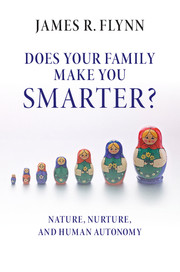Book contents
- Frontmatter
- Dedication
- Epigraph
- Contents
- List of figures, tables and boxes
- Acknowledgments
- Part I Human autonomy
- Part II Intelligence
- For scholars who wish to use the Age-Table Method to measure family effects in nations other than the USA
- Appendix I Wechsler Vocabulary and description of method of analysis
- Appendix II Stanford-Binet Vocabulary
- Appendix III Raven's Progressive Matrices
- References
- Name index
- Subject index
Appendix II - Stanford-Binet Vocabulary
Published online by Cambridge University Press: 05 June 2016
- Frontmatter
- Dedication
- Epigraph
- Contents
- List of figures, tables and boxes
- Acknowledgments
- Part I Human autonomy
- Part II Intelligence
- For scholars who wish to use the Age-Table Method to measure family effects in nations other than the USA
- Appendix I Wechsler Vocabulary and description of method of analysis
- Appendix II Stanford-Binet Vocabulary
- Appendix III Raven's Progressive Matrices
- References
- Name index
- Subject index
Summary
Sources
Thorndike, R. L., Hagen, E. P., and Sattler, J. M. (1986). Stanford- Binet Intelligence Scale: Fourth Edition. Chicago: Riverside. (SB-4; 1985)
Roid, G. H. (2003). Stanford-Binet Intelligence Scales: Fifth Edition. Itasca, IL: Riverside. (SB-5; 2001)
Table 5 in the main text uses Stanford-Binet 5 (2001) Vocabulary to provide the crucial data, data showing that there is a “pattern of progressive gaps” between earlier ages and the target age (ages 50–59). Therefore, I will first supply the raw data and calculations on which Table 5 is based. I do not use levels 1 (−3 SD) or 19 (+3 SD) from the manual because they are not a true measure, in the sense that they give no average score, rather they lump together all raw scores that exhaust their theoretical range. Therefore, they give no indication of either the gaps at those levels or of the variance of raw scores over the whole curve. To get the latter, subtract the raw score at level 2 from that at level 18 (for example, at the target age, 53 − 26 = 27).
Now I can pass on to give the usual data on which the estimates of the disadvantage/advantages at each performance level is based.
Step I
SB Vocabulary (or Verbal Knowledge) data: raw scores by age at various performance levels. Values in bold emphasized as key in the computations that follow.
To adjust the SB-4 result, to compensate for the fact that earlier ages had to be normed on ages 18–24, I need to calculate what difference it would make had the SB-5 also been normed on ages 18–24. Therefore, I got raw score values by averaging the ones for both ages 18 and 20–24 from the SB-5 data.
Step II
How to get the values by level (+2 to −2 SD).
- Type
- Chapter
- Information
- Does your Family Make You Smarter?Nature, Nurture, and Human Autonomy, pp. 186 - 202Publisher: Cambridge University PressPrint publication year: 2016



